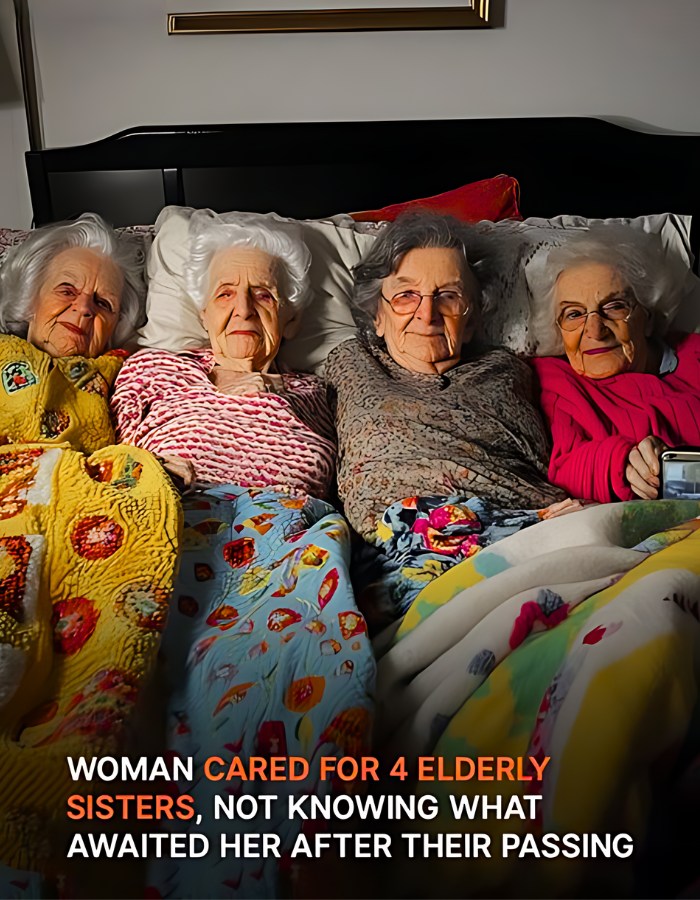An unfortunate medical caretaker named Cassandra Myers carried on with a humble life while working at a neighborhood emergency clinic. Despite the fact that medical attendants for the most part acquire nice wages in America, Cassandra wound up battling monetarily in light of the fact that a lot of her pay went toward taking care of her late guardians’ obligations. She dwelled in her genealogical home, situated in a tranquil neighborhood where her main close by sidekicks were four older kin, all in their 80s.
Cassandra frequently noticed these old neighbors battling with everyday undertakings like conveying food, cleaning their home, making a garbage run, and getting ready feasts. Understanding that they needed help, she offered her assistance at whatever point she got back from her medical clinic shifts. The four sisters valued her endeavors and appreciated her conversation enormously. At some point, the oldest sister, Marie, offered her thanks, proposing they pay Cassandra for her assistance.
Nonetheless, Cassandra benevolently denied, making sense of that she was helping them out of care and not so much for monetary profit. She made it a highlight help them day to day, preparing their feasts, washing dishes, sorting out their meds, and in any event, assisting them with getting dressed. During one supper together, Cassandra inquired as to why the sisters hadn’t considered moving to a nursing home, where they could get better consideration. Clara, one of the sisters, uncovered that they had decided to remain together in their own home as opposed to be isolated in a nursing office. They esteemed spending their leftover days encompassed by veritable love and care, which they felt probably won’t be available in a nursing home environment. Understanding their viewpoint, Cassandra consoled them that she would continuously be there to help. The sisters were profoundly moved by her graciousness, with one of them commenting that she was the best neighbor anybody could want.
Regardless of her fatigue from work, Cassandra stayed focused on visiting the kin consistently, imparting feasts to them and watching out for their requirements. Unfortunately, as time elapsed, the sisters started to die individually. Cassandra grieved every misfortune profoundly and volunteered to sort out their memorial services. After the last sister died, Cassandra went to the burial service, where she met a legal counselor named Abigail Smith. The legal counselor offered her thanks to Cassandra for dealing with the sisters and illuminated her that there was something significant she expected to examine.
The next day, Cassandra visited Abigail’s office, where she was given a record. The attorney made sense of that the sisters had kids living in adjacent states, yet these youngsters had not tried to go to any of the memorial services. Hurt by their kids’ disregard, the sisters had chosen to change their will, passing on everything to Cassandra instead. Cassandra was paralyzed by this disclosure. She never expected to acquire the sisters’ bequest, which included cash, adornments, and the house. In spite of the fact that she felt undeserving, Abigail consoled her that the sisters considered her to be to a greater extent a girl rather than their own youngsters, making her the legitimate successor.
The legacy was all that anyone could need for Cassandra to take care of her folks’ obligations, yet the circumstance became confounded when the sisters’ kids found out about the will. At first, they needed to challenge it in court, yet before they could continue, Lawyer Abigail sent them letters from their moms. These letters, indistinguishable for every youngster, communicated the moms’ affection yet additionally their profound dissatisfaction over being disregarded in their later years. The letters made sense of that the moms had passed on their fortune to somebody who had been there for them when their kids were not. After getting the letters, the youngsters chose to pull out their claim. They understood how inadequately they had treated their moms and acknowledged that they merited no piece of the inheritance. Though Cassandra never met the sisters’ kids, she saw new blossoms on the ladies’ graves every year on their passing commemorations. This little signal brought her solace, realizing that the sisters’ kids were at long last regarding their moms, regardless of whether it was past the point of no return.









